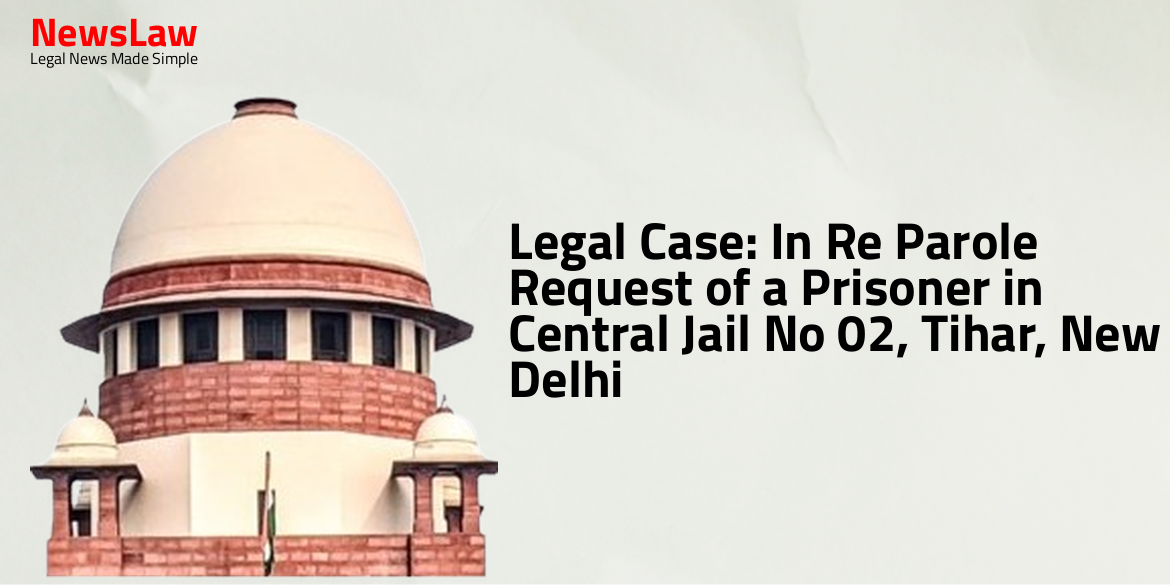In a significant legal development, the Delhi High Court recently delivered a judgement related to dispute resolution and contractual obligations. The case involved parties engaged in a contractual agreement, where issues regarding delivery of goods and mitigation of losses arose. The court’s decision sheds light on the nuances of contract law and highlights the importance of adhering to contractual terms. Stay informed about this insightful ruling from the Delhi High Court.
Facts
- MTNL filed IA No.15141/2011 under Rule 9 CPC for appointment of a receiver to dispose of goods
- MTNL did not want to dispose of goods on its own to avoid disputes over selling price
- Requested appointment of a local commissioner to sell goods transparently for correct market value
- Arbitrator fixed ad-hoc amount of Rs.2.5 lakhs for MTNL to pay for the period until the award
- Mafatlal filed IA 15141/2011 for appointment of a receiver to dispose of remaining goods
- Mafatlal willing to undertake disposal at own expense, not opposed by respondent
- Arbitrator awarded Rs.2,22,77,450 to Mafatlal for balance quantity delivery, and Rs.32,60,368 for claim No.6
- Arbitrator also awarded interest and costs, rejected other claims and counterclaims
- Arbitrator deleted Sandhya from parties array on MTNL’s application
- Mafatlal challenged deductions from claims, lower interest rate in award
- The Award is contradictory as it holds Mafatlal to the obligation of mitigation but still awards damages without mitigation being proven.
- Damages were awarded for the use of Mafatlal’s godown at a rate of Rs. 50 per square foot per month and for moth-proofing of goods at Rs. 1 per meter annually.
- The Arbitrator erred in granting damages to Mafatlal based on the ‘cost price’ of the cloth, despite MTNL not attempting to mitigate damages by selling the cloth in the open market.
Issue
- The issue being examined is whether the respondent could invoke clause 6 of the Conditions of Contract after the claimant had already manufactured and offered the supplies of the balance quantity within the stipulated period.
- The claimant had manufactured and offered to deliver the balance quantity within the schedule of delivery.
- The key question is whether the respondent’s invocation of clause 6 was valid after the claimant’s actions.
Arguments
- The contract did not provide for recovery of the price by Mafatlal.
- The cost price was erroneously computed by the Arbitrator.
- Mafatlal is no longer able to deliver the balance quantity of cloth to MTNL.
- The Award was in the nature of specific performance which was not granted in the contract.
- Mr. Rustagi argued that the goods were specifically manufactured for MTNL justifying the acceptance of claim No.3 without insisting on mitigation.
- MTNL did not suggest that the goods could have been disposed of in their application under Section 17 of the Act.
- Mafatlal was bound to preserve the goods by the orders of the Arbitrator under Section 17 of the Act.
- Recovery of the entire contract price should have been granted to the claimants according to Mr. Rustagi.
- The contractual entitlement to the price belonged to Sandhya, not Mafatlal.
- Reference to Maharashtra State Electricity Distribution Co. Ltd. v. Datar Switchgear Ltd. to support the argument on mitigation.
- Under Sale of Goods Act, 1930, the goods were tendered to MTNL in a deliverable state and the property passed to MTNL.
- Mafatlal had the right to exercise a lien on the goods and resell them under Sections 44 and 46 of the Sale of Goods Act, 1930.
- Claim No.6 lacked evidence as acknowledged by the Arbitrator.
- The learned Arbitrator deleted Sandhya from the array of parties at the instance of MTNL itself.
- Mr. Rustagi disputed the characterization of the Award as specific performance, emphasizing that Sandhya would not have a separate claim if the Award is satisfied in favor of Mafatlal.
- He cited judgments of the court in support of his arguments.
- Mafatlal, along with Sandhya, filed the statement of claim and there was no dispute between them.
- Mr. Rustagi acknowledged that the award towards moth-proofing cost would not be pressed due to lack of evidence.
- The sale was conducted by a court-appointed local commissioner, and Mafatlal is willing to credit the amount to MTNL in lieu of handing over the goods as per the Award.
- Mafatlal was not required to mitigate its losses according to the analysis of the Arbitrator on Claim No. 3.
- The claimed amounts were proved by Mafatlal’s witness, and MTNL did not present any contrary evidence.
- Mr. Rustagi argued that the sale of goods after the Award does not affect the validity of the Award to which MTNL consented.
- Regarding the quantification of claims for storage and maintenance, Mr. Rustagi explained that Mafatlal claimed damages for storing the goods in their own facility rather than a third-party facility.
Analysis
- The Award on the point of maintenance includes the value of the storage facility of Mafatlal and the cost of moth-proofing the cloth.
- The claimant no.01 did not make efforts for the sale of the cloth, which could have mitigated losses.
- Sandhya was deleted as a claimant in the Award at the instance of MTNL despite being involved in raising invoices and accepting payments.
- The arbitrator allowed the application to proceed only between Claimant No 1 and MTNL, as they had the contract and purchase orders.
- The cost price used by the arbitrator for calculating damages was the amount at which Sandhya was to procure the goods from Mafatlal.
- The Court upheld the award of mesne profits based on the claimant’s evidence.
- The Arbitrator’s computation of damages was based on the evidence presented and was not considered defective.
- The sale of goods did not impact the award as it was compliant with court orders.
- The argument regarding the cost price computation was rejected as the arbitrator’s decision was based on evidence.
- The award was conditional upon delivery of the balance quantity of goods, which were sold as directed by the Court.
- The value of the goods was satisfactorily assessed by the Court and the amount was withdrawn by Mafatlal in compliance with the Award.
- The award in favor of Mafatlal was deemed appropriate as the contract terms were fulfilled.
- Efforts to find buyers for the remaining cloth quantity were made by the claimant but no buyers were found due to specific specifications required by MTNL.
- The arbitrator’s decision on damages and storage charges was upheld as it was based on evidence and fair assessment.
- The award did not involve specific performance but rather focused on damages and contractual obligations.
- The award issued by the arbitrator was considered justified and warranted no interference under Section 34 of the Act.
- The Arbitrator found no infirmity in the finding related to the refund claim of ‘commission at the rate of 15%’ paid by Mafatlal to Sandhya.
- The Arbitrator rejected the refund claim based on the terms of the contract, which specified the composite contract price of Rs. 369.50 per meter.
Decision
- OMP(COMM) 42/2017 and OMP(COMM) 62/2017 dismissed as not pressed
- Award for claim No. 6 set aside in OMP(COMM) 34/2017
- Claim No. 3 not reopened at the instance of MTNL
- Challenges to the Award by Mafatlal and Sandhya not pressed
- Challenge to the rest of the claims and denial of counterclaims rejected
- Mafatlal free to invoke arbitration afresh on claim if advised
Case Title: MAFATLAL INDUSTRIES LIMITED & ANR. Vs. MAHANAGAR TELEPHONE NIGAM LIMITED (2024:DHC:4563)
Case Number: OMF-255/2018



